Two balls having linear momenta →p1=pˆi and →p2=−pˆi, undergo a collision in fre space. There is no external force acting on the ball. Let →p′1 and →p′2 be their final moment. Which of the following option(s) is (are) NOT ALLOWED for an non zero value of p,a1,a2,b1,b2,c1 and c2.
→p1'=a1ˆi+b1ˆj+c1ˆk,→p2'=a2ˆi+b2ˆj
→p1'=c1ˆk,→p2'=c2ˆk
→p1'=a1ˆi+b1ˆj+c1ˆk,→p2'=a2ˆi+b2ˆj−c1ˆk
→p1=a1ˆi+b1ˆj,→p2'=a2ˆi+b1ˆj
The correct Answer is:A, D
Step by step video, text & image solution for Two balls having linear momenta vecp_(1)=phati and vecp_(2)=-phati, undergo a collision in fre space. There is no external force acting on the ball. Let vecp_(1)^(') and vecp_(2)^(') be their final moment. Which of the following option(s) is (are) NOT ALLOWED for an non zero value of p,a_(1),a_(2),b_(1),b_(2), c_(1) and c_(2). by Physics experts to help you in doubts & scoring excellent marks in Class 12 exams.
Topper's Solved these Questions
Similar Questions
Knowledge Check
- Question 1 - Select One
Two balls , having linear momenta →p1=pˆi and →p2=−pˆi , undergo a collision in free space. There is no external force acting on the balls. Let →p1 and →p2, be their final momenta. The following option(s) is (are) NOT ALLOWED for any non -zero value of p,a1,a2,b1,b2,c1 and c2
(i) →p1=a1ˆi+b1ˆj+c1ˆk,→p2=a2ˆi+b2ˆj
(ii) →p1=c1→k,→p2=c2ˆk
(iii) →p1=a1ˆi+b1ˆj+c1ˆk,→p2=a2ˆi+b2ˆj−c1ˆk
(iv) →p1=a1ˆi+b1ˆj,→p2=a2ˆi+b1ˆjA(i),(ii)B(ii),(iii)C(iii),(iv)D(i),(iv) - Question 2 - Select One or More
The balls, having linear momenta →p1=→πand→p2_2=−→π, undergo a collision in free space. There is no external force acting on the balls. Let →p'1and→p'2 be their final momenta.The following option (s) is (are) NOT ALLOWED for any non-zero value of p,a1,a2,b1,b2,c1andc2.
A→p'1=a1ˆi+b1ˆj+c1ˆk
→p'2=a2ˆi+b2ˆjB→p'1=c1ˆk
→p'2=c2ˆkC→p'1=a1ˆi+b1ˆj+c1ˆk
→p'2=a2ˆi+b2ˆj−c1ˆkD→p'1=a1ˆi+b1ˆj
→p'2=a2ˆi+b1ˆj - Question 3 - Select One
Let →p=3ax2ˆi−2(x−1)ˆj,q=b(x−1)ˆi+xˆj and ab<0. Then →p and →q are parallel for:
Aatleast one x in (0,1)Batleast one x in (−1,0)Catleast one x in (1,2)DNone of these
if△=⎡⎢⎣a1b1c1a2b2c2a3b3c3⎤⎥⎦
View SolutionConsider two vectors →p1=4ˆi−3ˆj+5ˆkand→p2=−6ˆi+3ˆj−2ˆk. What is (→p1+→p2).(→p1×5→p2) ?
View SolutionIf (a1,b1,c1) and (a2,b2,c2) be the direction rations of two parallel lines then
View SolutionTwo dipoles →P1 and →P2 are oriented as shown in the figure. Assuming dipole of dipole moment →P2 to be placed at origin and dipole of moment →P1 is at a distance 'd' from origin then
 View Solution
View SolutionIf in equation a1x+b1y+c1=0anda2x+b2y+c2=0a1a2=b1b2≠c1c2 then which of the following is true?
View Solution
